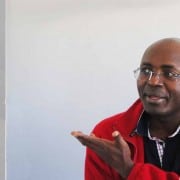|
Getting your Trinity Audio player ready...
|
Part two of our series on media freedom in the Southern African region looks at positive developments around this issue. Some countries – including South Africa – are working on abolishing the criminal defamation law, and meanwhile the African Court has ruled that jail terms for journalists found guilty of the offence, are a violation of the African Charter’s terms on freedom of expression.
In part one, a trio of investigative journalists – Rafael Marques de Morais, Tomás Vieira Mário and Tom Nkosi – who have been targeted by their respective governments, shared their individual experiences with us.
Criminal defamation on the way out?
There is a trend of trying to decriminalise defamation around the world – the UN Human Rights Committee has said that countries should consider the decriminalisation of defamation, and it also said that they must ensure that the offence operates in a way that does not stifle freedom of expression. The African Commission on Human and Peoples’ Rights has backed this call.
The African Court ruled in December 2014 that jail terms for criminal defamation violate the African Charter’s protection of freedom of expression. In its judgment on a case in which Burkina Faso journalist Lohé Issa Konaté was jailed for a year after he accused a prosecutor of corruption in newspaper reports, the court held that it is disproportionate to send journalists to jail or impose excessive fines on them for reporting information, especially if it’s in the public interest.
The judgment is binding on African Union member states, where imprisonment for libel is rife, and will have major implications for media freedom across the continent. Lawyers were disappointed, however, that the court did not rule that the offence itself was inconsistent with the charter.
Various laws used to oppress
Criminal defamation is not the only tool used to suppress expression – there are also laws pertaining to insults and false news which, according to London-based freedom of expression group Article 19, are used by repressive countries but are rare in the more established democracies and have been ruled unconstitutional in some. Zambia has even used colonial-era idle and disorderly conduct laws for repression, charging an activist with soliciting for an immoral purpose, because he argued that homosexual practices should be decriminalised as a way of combating the Aids epidemic.
Zambia, Uganda and Zimbabwe have all decriminalised false news offences, as they hold them to be inconsistent with the constitutional protection of the right to expression.
However, section 44 of Botswana’s Corruption and Economic Crime Act carries a warning that people who publish details of investigations carried out under the act could face a fine or a jail term. This is being used to silence journalists who are trying to expose corruption amongst public officials, said James. And in South Africa, both the Supreme and Constitutional courts have ruled that criminal defamation and contempt of court are not unjustifiable limitations of the right to freedom of expression.
SA ponders abolition of criminal defamation
The issue came under discussion last month when the ANC, the South African National Editors’ Forum and civil society engaged on whether or not to remove criminal defamation from the statute books. Those present agreed that criminal defamation should be removed from the country’s common law, as it is unconstitutional and stifles discussion and democratic processes. The ANC wants to use civil processes, rather than criminal ones, to pursue defamation claims.
Announcing the gathering, the ANC’s legal advisor Krish Naidoo said that media in South Africa should feel free to be critical about the country’s democracy without the fear of criminal sanctions.
“We need to think progressively,” he said, adding that the party’s legal research team had looked at other countries which had done away with criminal defamation such as the UK, Jamaica, Kenya, and even Zimbabwe, whose Constitutional Court rejected criminal defamation laws in mid-2014.
However, this ruling was made only in terms of the country’s former constitution, and not the new constitution which came into effect in 2013 during the referendum held in March that year.








